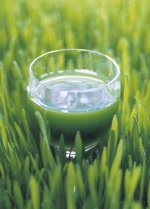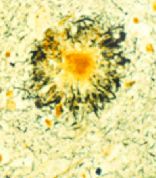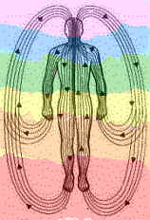 Here is another in our ongoing series on recent marijuana-related medical research.
Here is another in our ongoing series on recent marijuana-related medical research.
Cannabidiol (CBD) is a major product of the marijuana plant. It lacks marijuana’s psychological effects, and it has been suggested that CBD might be effective as an antipsychotic. The aim of this study was to investigate the response to CBD in treatment-resistant schizophrenia.
Continue reading Cannabidiol not effective in treatment-resistant schizophrenia →
 For this study, researchers created a computer-simulated community of 100,000 people that resembled the population of Olmsted County, Minnesota, in 2000.
For this study, researchers created a computer-simulated community of 100,000 people that resembled the population of Olmsted County, Minnesota, in 2000.
By raising omega-3 fatty acid levels among all the Olmsted cyber-citizens, the researchers estimated that the overall death rate could be reduced 6.4%. By contrast, automated external defibrillators (AEDs) reduced death rates by 0.8%, and implanted defibrillators reduced deaths by 3.3%.
Don’t laugh. Computer-simulated research could be the next big thing, especially where the cost of healthcare is concerned.
For example?
Continue reading Omega-3 fatty acids better than defibrillators to prevent sudden death! →
 It has everything needed to become a cult health food icon.
It has everything needed to become a cult health food icon.
Historical context: Edmund Szekely translated an ancient manuscript in the Vatican’s secret archives, which stated, “Wheatgrass is a good food for man.”
A villain: “In my desperation … I turned to the medical profession only to have most doctors I went to uninformed about my illness. One doctor even said … I may as well learn to live with it.”
Rebirth: “Ultimately, I accepted the responsibility of getting myself well.”
A happy ending: “I integrated raw (living) food and chlorophyll into my diet. The chlorophyll I use comes from wheatgrass. I grow the grass indoors.”
Lovely. But what’s in wheatgrass that warrants so much attention?
Continue reading Wheatgrass juice: The nectar of rejuvenation? →
 This is a bit technical, but I think it’s important because it documents the ability of peppermint to act as an antispasmodic agent in the small intestine.
This is a bit technical, but I think it’s important because it documents the ability of peppermint to act as an antispasmodic agent in the small intestine.
Continue reading Peppermint oil as an antispasmodic in the small intestine →
 Diets rich in lutein plus zeaxanthin may protect against intermediate age-related macular degeneration (AMD) in healthy women younger than 75 years, according to a study just published in the Archives of Ophthalmology.
Diets rich in lutein plus zeaxanthin may protect against intermediate age-related macular degeneration (AMD) in healthy women younger than 75 years, according to a study just published in the Archives of Ophthalmology.
The findings are significant because there is no cure for AMD, only limited treatments are available, and there is no established means of prevention. Therefore, any intervention that lowers the risk for AMD is potentially important.
But what are lutein and zeaxanthin, and where can you get them?
Continue reading Sources of lutein and zeaxanthin to help prevent age-related macular degeneration →
 According to the distributor’s website, “Raindrop combines the art of aromatherapy with the techniques of Vita Flex and massage in the application of essential oils to various areas of the body to bring structural and electrical alignment.” A description of the treatment is described here.
According to the distributor’s website, “Raindrop combines the art of aromatherapy with the techniques of Vita Flex and massage in the application of essential oils to various areas of the body to bring structural and electrical alignment.” A description of the treatment is described here.
Structural and electrical alignment?
Get serious.
Continue reading Raindrop therapy →
 The latest issue of the International Journal of Impotence Research included several articles of interest from a CAM perspective, here and here. Here’s one more.
The latest issue of the International Journal of Impotence Research included several articles of interest from a CAM perspective, here and here. Here’s one more.
Men in Hong Kong who smoked more than 20 cigarettes daily had a significantly greater risk of erectile dysfunction than men who never smoked. Nothing new here. Similar results have been reported in other groups.
However, it raises the question of just how smoking can cause erectile dysfunction.
Continue reading Smoking and impotence →
 A just published survey of the medical literature found that moderate to high physical activity was associated with a lower risk of erectile dysfunction (ED).
A just published survey of the medical literature found that moderate to high physical activity was associated with a lower risk of erectile dysfunction (ED).
The authors rightly caution, “the apparent ‘protective’ effect of physical activity on ED should be further investigated.” But, considering the many benefits of increased physical activity, it’s probably not too early to reconsider the disadvantages of a sedentary lifestyle.
8/28/06 21:19 JR
 In an earlier post, the positive effect of the Mediterranean diet on erectile dysfunction in men with the metabolic syndrome was discussed. Now, another positive study has appeared.
In an earlier post, the positive effect of the Mediterranean diet on erectile dysfunction in men with the metabolic syndrome was discussed. Now, another positive study has appeared.
Continue reading More positive data on the Mediterranean diet for impotence →
 There is evidence that abnormal concentrations of positively-charged metal ions (eg, copper, iron, and zinc) interact with beta-amyloid in the brain during the development of Alzheimer’s disease. Therefore, correcting these abnormal levels might help people with this disease. (The photo shows yellow amyloid plaque surrounded by black neurofibrillary tangles.)
There is evidence that abnormal concentrations of positively-charged metal ions (eg, copper, iron, and zinc) interact with beta-amyloid in the brain during the development of Alzheimer’s disease. Therefore, correcting these abnormal levels might help people with this disease. (The photo shows yellow amyloid plaque surrounded by black neurofibrillary tangles.)
One option for treatment is chelation.
Continue reading Chelation therapy meets nanotechnology →
 Everybody in the west knows that lead is toxic, right? We spend lots of money removing lead paint from the walls of old houses. So, what is the logic that justifies adding lead to ayurvedic medicines?
Everybody in the west knows that lead is toxic, right? We spend lots of money removing lead paint from the walls of old houses. So, what is the logic that justifies adding lead to ayurvedic medicines?
Dr. Annapoorna Chirra from the Department of Medicine at UCLA has the answer.
Continue reading The rationale for adding lead to medicine →
 The New York Times Magazine published a travelogue by a San Francisco woman who spent time In India as an “ayurveda tourist.” The goal of the trip was to “immerse [herself] in ayurveda, the 3,500-year-old herb-based healing tradition that still flourishes in the daily life of India.”
The New York Times Magazine published a travelogue by a San Francisco woman who spent time In India as an “ayurveda tourist.” The goal of the trip was to “immerse [herself] in ayurveda, the 3,500-year-old herb-based healing tradition that still flourishes in the daily life of India.”
As might be expected of a San Franciscan writing in NYT, she managed to insert a dig at Dick Cheney, but not once in 2900 words mentions the problem of lead poisoning associated with ayurvedic medicines.
Guess you have to pick your poison. But if she can’t do it, I will.
Continue reading Lead poisoning and ayurvedic medicines →
 Polarity is one of many new age holistic health practices. It attempts to cure disorders in mind, body and spirit, and promote “wholeness.”
Polarity is one of many new age holistic health practices. It attempts to cure disorders in mind, body and spirit, and promote “wholeness.”
A nice idea. But there is little except faith supporting the premise. One study in a very small population of cancer patients was reviewed here.
What can you expect during a session of polarity therapy? Touching, stretching, eating, and counseling of course.
If you’re ready, let’s look closer at what goes on during a typical session.
Continue reading The new age of polarity therapy →
 Making the rounds this morning is a Newswire release from MD Anderson Cancer Center about Cherie Perez. She’s a research nurse who teaches aromatherapy to cancer patients during their treatment at the Cancer Center. You can read it here.
Making the rounds this morning is a Newswire release from MD Anderson Cancer Center about Cherie Perez. She’s a research nurse who teaches aromatherapy to cancer patients during their treatment at the Cancer Center. You can read it here.
Since my background is based in traditional medicine, the involvement of this prestigious medical center sparks my interest to learn more about aromatherapy. I start by looking for structure.
It turns out, there are lots of ways to use oils.
Here, from Psychology Today are the five common types of aromatherapy.
Continue reading Aromatherapy: Getting organized →
 In the Polarity model, “health is experienced when energy systems function in their natural state,” according to the “American Polarity Therapy Association (APTA).
In the Polarity model, “health is experienced when energy systems function in their natural state,” according to the “American Polarity Therapy Association (APTA).
Sounds good. And in a study of 15 women undergoing radiation therapy for breast cancer there was a statistically significant improvement in cancer-related fatigue and health-related quality of life.
Continue reading Polarity therapy and radiotherapy-induced fatigue →
 The Washington Post has an article this morning on the garish state of cereal box design. It got me thinking inside the box.
The Washington Post has an article this morning on the garish state of cereal box design. It got me thinking inside the box.
The United States has the fourth highest per capita consumption of cereal in the world (behind Ireland, England, and Australia). Each year, more than 90% of U.S. households purchase cold cereal. That’s about 10 pounds, or 160 bowls, of cereal eaten per person each year!
Does it matter which one you eat?
Continue reading Think inside the box. Which cereal you eat does matter →
 Two studies published this summer showed positive health effects of curry. One looked at brain function, the other at the colon.
Two studies published this summer showed positive health effects of curry. One looked at brain function, the other at the colon.
First, the brain.
Mini-Mental State Examination (MMSE) scores were compared among 1010 elderly Asians, aged 60 to 93 years. The MMSE is used to determine the extent of dementia in adults. The results of the test were then compared to categories of curry consumption: “often” (more than once a month), “occasionally” (once or more in 6 months but less than once a month), and “never or rarely.”
And the results.
Continue reading A good summer for curry →
 The INTERHEART study reviewed case histories from more than 27,000 people in 52 countries. They found that tobacco use in any form, including sheesha smoking, beedie smoking, chewing tobacco, and secondhand smoke is harmful to your health.
The INTERHEART study reviewed case histories from more than 27,000 people in 52 countries. They found that tobacco use in any form, including sheesha smoking, beedie smoking, chewing tobacco, and secondhand smoke is harmful to your health.
How bad is it?
Continue reading Another study confirms the risks of any tobacco use →
 Chinese cotton growers were among the first farmers to plant genetically modified (GM) cotton to resist bollworms (photo). Now, the substantial profits they reaped for several years by saving on pesticides have eroded.
Chinese cotton growers were among the first farmers to plant genetically modified (GM) cotton to resist bollworms (photo). Now, the substantial profits they reaped for several years by saving on pesticides have eroded.
The reason, according to Cornell University researchers is that other pests are attacking the GM cotton.
Continue reading A problem for genetically modified crops that has nothing to do with environmentalists →
 In a previous post I reviewed policosanol, which can lower LDL (bad) cholesterol levels by 20% to 30%.
In a previous post I reviewed policosanol, which can lower LDL (bad) cholesterol levels by 20% to 30%.
The source of policosanol seems to influence its activity, with Cuban sugar cane-based policosanol being most effective. It’s available on the Internet and in stores. In fact, One-A-Day Cholesterol Plus contains sugar cane-based policosanol.
Now, a study conducted at the University of Kentucky College of Pharmacy shows how it works.
Continue reading How policosanol lowers cholesterol and implications for your safety →
Complementary and Alternative Medicine: Fair, Balanced, and to the Point
![]() Here is another in our ongoing series on recent marijuana-related medical research.
Here is another in our ongoing series on recent marijuana-related medical research. For this study, researchers created a computer-simulated community of 100,000 people that resembled the population of Olmsted County, Minnesota, in 2000.
For this study, researchers created a computer-simulated community of 100,000 people that resembled the population of Olmsted County, Minnesota, in 2000. It has everything needed to become a cult health food icon.
It has everything needed to become a cult health food icon. This is a bit technical, but I think it’s important because it documents the ability of peppermint to act as an antispasmodic agent in the small intestine.
This is a bit technical, but I think it’s important because it documents the ability of peppermint to act as an antispasmodic agent in the small intestine. According to the distributor’s
According to the distributor’s  The latest issue of the International Journal of Impotence Research included several articles of interest from a CAM perspective,
The latest issue of the International Journal of Impotence Research included several articles of interest from a CAM perspective,  There is evidence that abnormal concentrations of positively-charged metal ions (eg, copper, iron, and zinc) interact with beta-amyloid in the brain during the development of Alzheimer’s disease. Therefore, correcting these abnormal levels might help people with this disease. (The photo shows yellow amyloid plaque surrounded by black neurofibrillary tangles.)
There is evidence that abnormal concentrations of positively-charged metal ions (eg, copper, iron, and zinc) interact with beta-amyloid in the brain during the development of Alzheimer’s disease. Therefore, correcting these abnormal levels might help people with this disease. (The photo shows yellow amyloid plaque surrounded by black neurofibrillary tangles.) Everybody in the west knows that lead is toxic, right? We spend lots of money removing lead paint from the walls of old houses. So, what is the logic that justifies adding lead to ayurvedic medicines?
Everybody in the west knows that lead is toxic, right? We spend lots of money removing lead paint from the walls of old houses. So, what is the logic that justifies adding lead to ayurvedic medicines? Polarity is one of many new age holistic health
Polarity is one of many new age holistic health  Two studies published this summer showed positive health effects of curry. One looked at brain function, the other at the colon.
Two studies published this summer showed positive health effects of curry. One looked at brain function, the other at the colon. The INTERHEART study reviewed case histories from more than 27,000 people in 52 countries. They
The INTERHEART study reviewed case histories from more than 27,000 people in 52 countries. They  Chinese cotton growers were among the first farmers to plant genetically modified (GM) cotton to resist bollworms (photo). Now, the substantial profits they reaped for several years by saving on pesticides have eroded.
Chinese cotton growers were among the first farmers to plant genetically modified (GM) cotton to resist bollworms (photo). Now, the substantial profits they reaped for several years by saving on pesticides have eroded. In a previous post I
In a previous post I